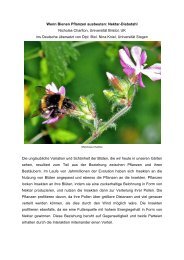PhDâ€theses - Ethologische Gesellschaft
PhDâ€theses - Ethologische Gesellschaft
PhDâ€theses - Ethologische Gesellschaft
You also want an ePaper? Increase the reach of your titles
YUMPU automatically turns print PDFs into web optimized ePapers that Google loves.
Reports from previous conferences<br />
THE HOTTEST CONFERENCE OF THE YEAR!<br />
Activities and Meetings<br />
What do you normally do with the program booklet you receive at a conference? Probably,<br />
you mark the talks you plan to attend. You might write down comments or ideas you get<br />
during an interesting lecture. Maybe you even paint little stars or boxes while waiting for a<br />
less exciting presentation to end.<br />
Now, please imagine a lecture hall, where almost all the audience is fanning<br />
themselves air with the program booklet. Different techniques are applied: Some fold the<br />
booklet in the middle, to have a more robust hand fan. Some hold it on the long edge; some<br />
on the small. Some with the right hand; some with the left. Some fan quickly; some slowly.<br />
But all fan. Welcome to the V European Conference on Behavioural Biology!<br />
Like every two years, behavioural biologists from all over Europe met to discuss<br />
results, exchange ideas and chat with old colleagues. This year the ECBB took place in<br />
Ferrara, Italy. Choosing an Italian city in the mid of July resulted in the supposedly hottest<br />
conference of the year. Despite the extreme temperatures, Leonida Fusani, associate<br />
professor at the University of Ferrara, and his team, managed to organise a sympathetic and<br />
successful conference.<br />
Elisabetta Visalberghi started the series of talks, by presenting the fascinating tool<br />
using abilities of capuchins: Those little monkeys not only use stone tools to crack open nuts.<br />
They also carefully select and transport the most appropriate tool for a specific task; an<br />
ability so far mostly associated with great apes and humans. The human abilities of tool use<br />
could be observed on the next day: Redouan Bshary, presenting the well‐deserved<br />
Tinbergen award to Katharina Hirschenhauser with warm and appreciatory words, applied<br />
all his manual skills to unwrap the bouquet of flowers. After finally receiving award and<br />
flowers, Katharina gave us an appealing overview of her work on hormones and behaviour.<br />
We learnt that the self‐perception of a fighter might be more important in the activation of<br />
testosterone associated genes than the actual outcome of the fight. In her plenary talk, Joan<br />
Strassmann gave an interesting introduction on the concept of organismality, applying this<br />
to her groups present work on Dictyostelium discoideum. Her vivid and inspiring<br />
presentation could even bring a true mammalogist to forget that it is "only" microbes, she is<br />
talking about.<br />
While Joan succeeded in presenting a whole world in a petri dish, Martin Wikelski<br />
needed the entire globe. He gave us a broad overview of what he and his co‐workers were<br />
and are achieving with the help of aircrafts, online databases (e.g.<br />
http://www.movebank.org/) and possibly NASA. And also, what he might be doing, if there<br />
was the money for it. To get a better grip on this money, he suggested, we European<br />
behavioural biologists should unite forces. Also Joan Strassmann had an idea of how<br />
corporative behaviour could improve our working success: She proposed, everybody should<br />
28



